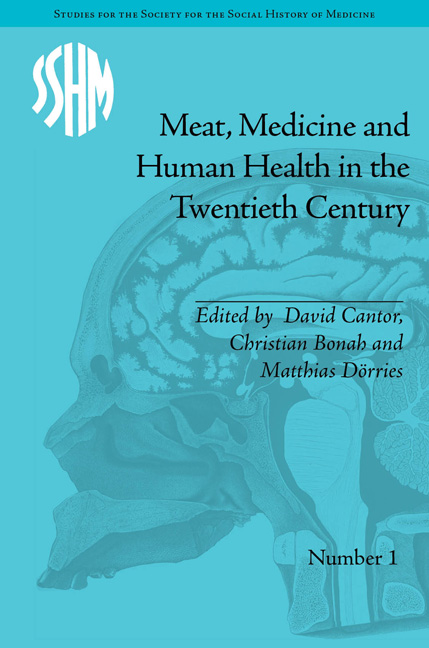Book contents
- Frontmatter
- CONTENTS
- Acknowledgements
- List of Contributors
- List of Figures and Tables
- Introduction
- Part 1 Meat and Therapeutics
- Part II Meat, Politics and Culture
- 4 What's Meatpacking got to do with Worker and Community Health?
- 5 Is Refrigerated Meat Healthy? Mexico Encounters the Chicago Meatpacking ‘Jungle’, c. 1910
- 6 Confused Messages: Meat, Civilization, and Cancer Education in the Early Twentieth Century
- 7 What's for Dinner? Science and the Ideology of Meat in Twentieth-Century US Culture
- 8 Vegetarianism, Meat and Life Reform in Early Twentieth-Century Germany and their Fate in the ‘Third Reich’
- Part III Meat, Risk and Regulation
- Notes
- Index
7 - What's for Dinner? Science and the Ideology of Meat in Twentieth-Century US Culture
from Part II - Meat, Politics and Culture
- Frontmatter
- CONTENTS
- Acknowledgements
- List of Contributors
- List of Figures and Tables
- Introduction
- Part 1 Meat and Therapeutics
- Part II Meat, Politics and Culture
- 4 What's Meatpacking got to do with Worker and Community Health?
- 5 Is Refrigerated Meat Healthy? Mexico Encounters the Chicago Meatpacking ‘Jungle’, c. 1910
- 6 Confused Messages: Meat, Civilization, and Cancer Education in the Early Twentieth Century
- 7 What's for Dinner? Science and the Ideology of Meat in Twentieth-Century US Culture
- 8 Vegetarianism, Meat and Life Reform in Early Twentieth-Century Germany and their Fate in the ‘Third Reich’
- Part III Meat, Risk and Regulation
- Notes
- Index
Summary
Barbeque, hamburgers, bacon and eggs, fried chicken: quintessential American foods – meat. They are emblematic of the ideology of meat – the belief that meat is the indispensable article of food. Statistical studies of our consumption patterns and persistent tropes in popular culture confirm these icons of the American scene, with the paradigmatic diet serving meat at two or three meals a day. Through periods of abundance and scarcity, through debates over the benefits and dangers of meat for human health, meat has remained the centrepiece of the American table and American culture in the twentieth century. Nutritionists could and did claim that so much meat was unhealthful or unnecessary and advised the families to eat less meat. Economists could and did bemoan the high cost of meat-rich diets and advised consumers to use meat substitutes such as cheese, eggs and grains. Manufacturers of potential alternatives like oatmeal elaborated on this counsel, celebrating the health benefits of their non-meat products. Yet, nutritional scientists also urged people to eat meat for their health, both physical and mental. Meat producers from farmers to packagers hyped the advantages of meat in the diet. The drive to educate Americans, primarily female consumers, about the place of meat in a healthful diet illustrates the public interplay of science and culture.
Women and the Ideology of Meat
From the colonial period, Americans had been known as meat eaters.
- Type
- Chapter
- Information
- Meat, Medicine and Human Health in the Twentieth Century , pp. 127 - 144Publisher: Pickering & ChattoFirst published in: 2014



